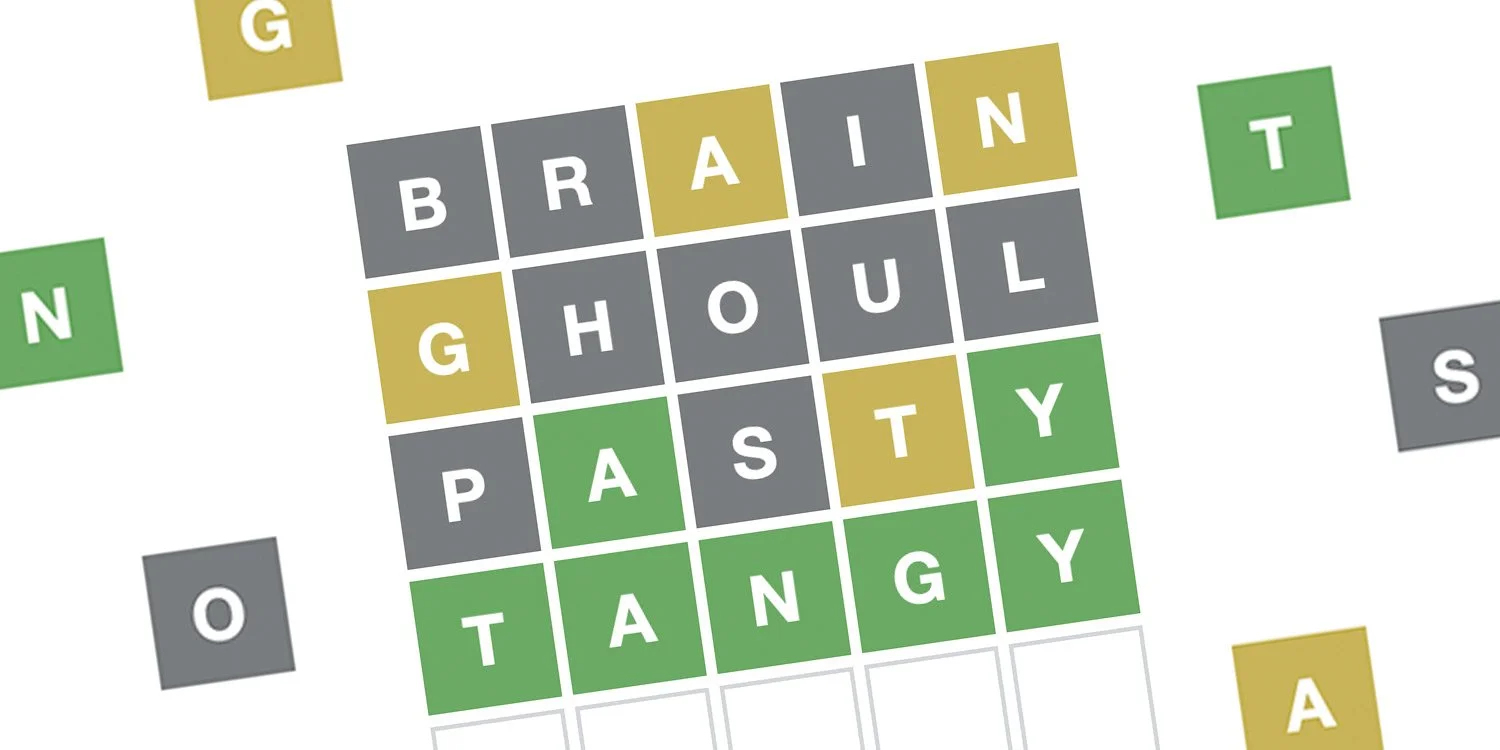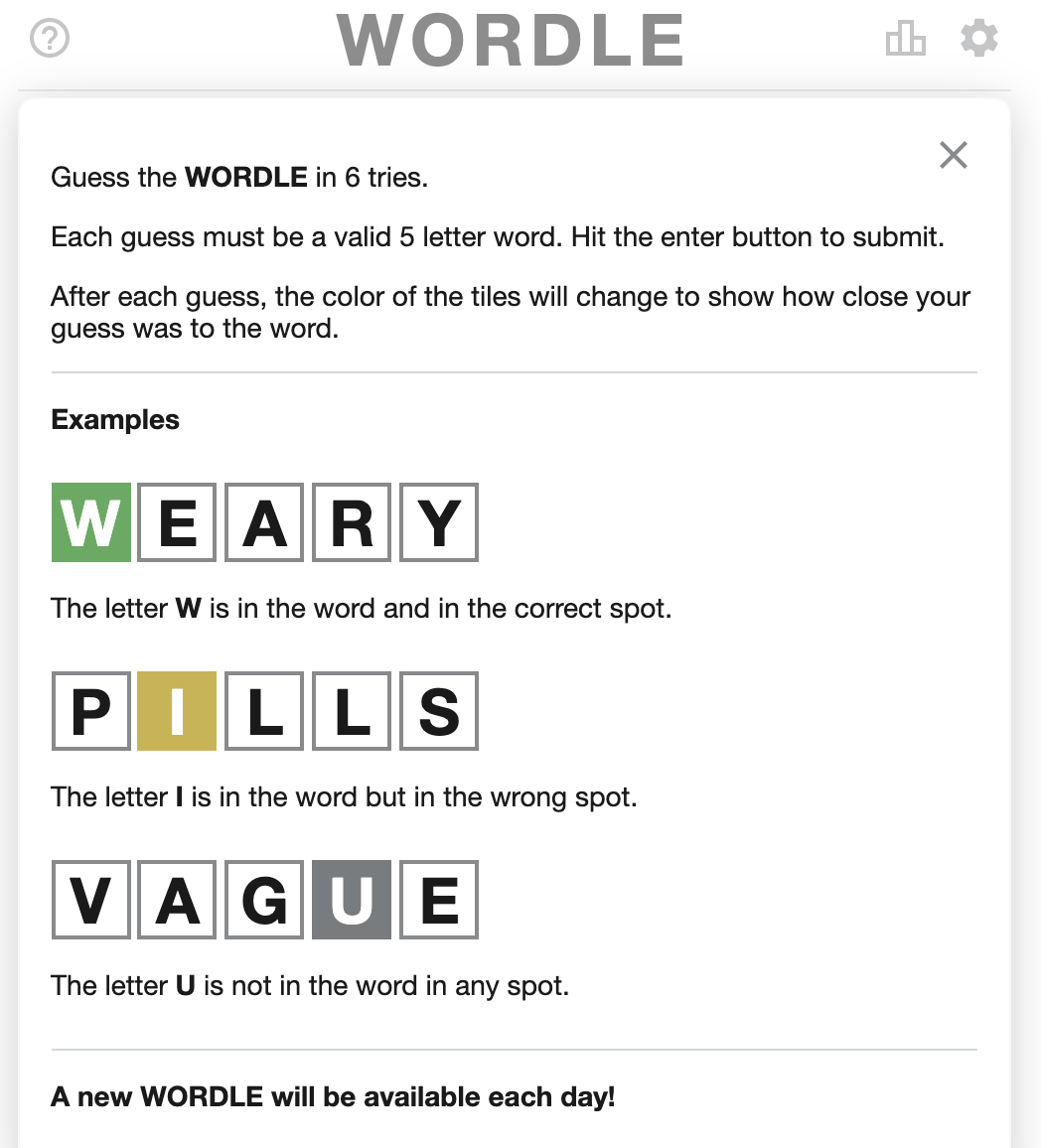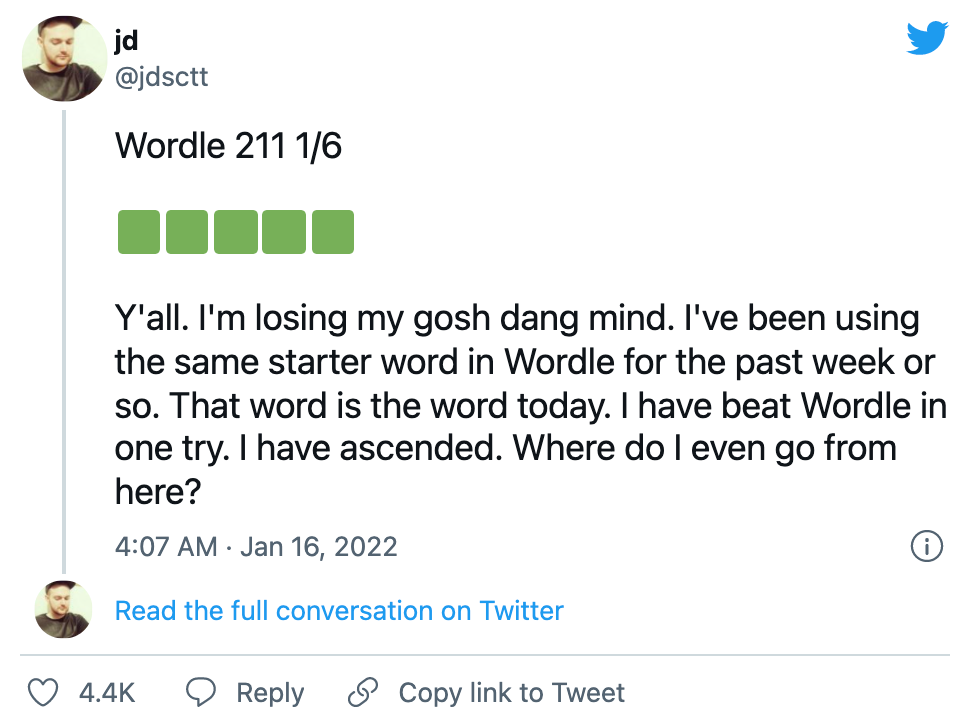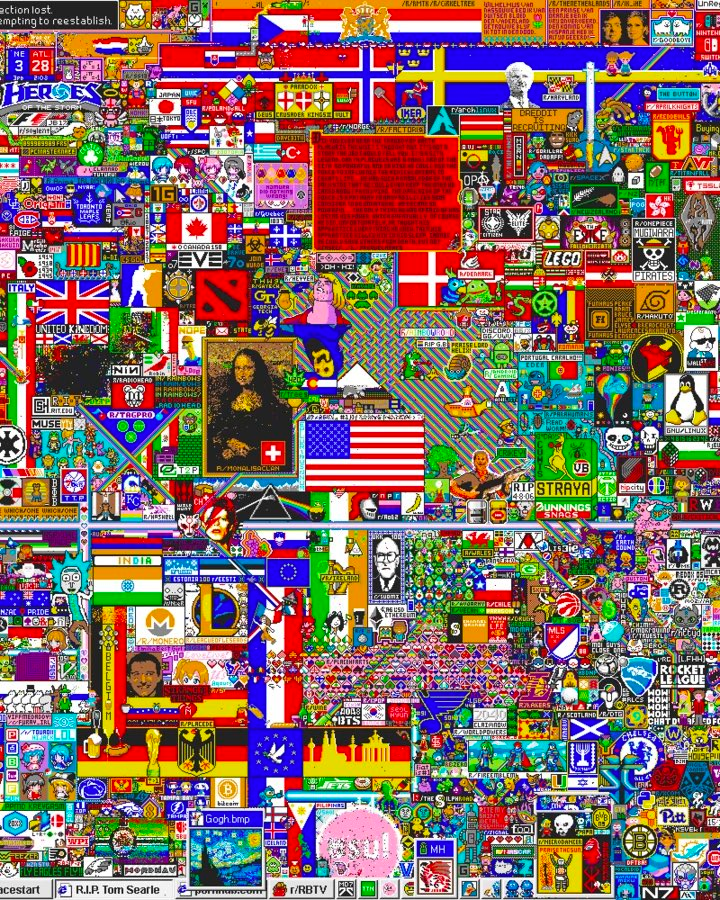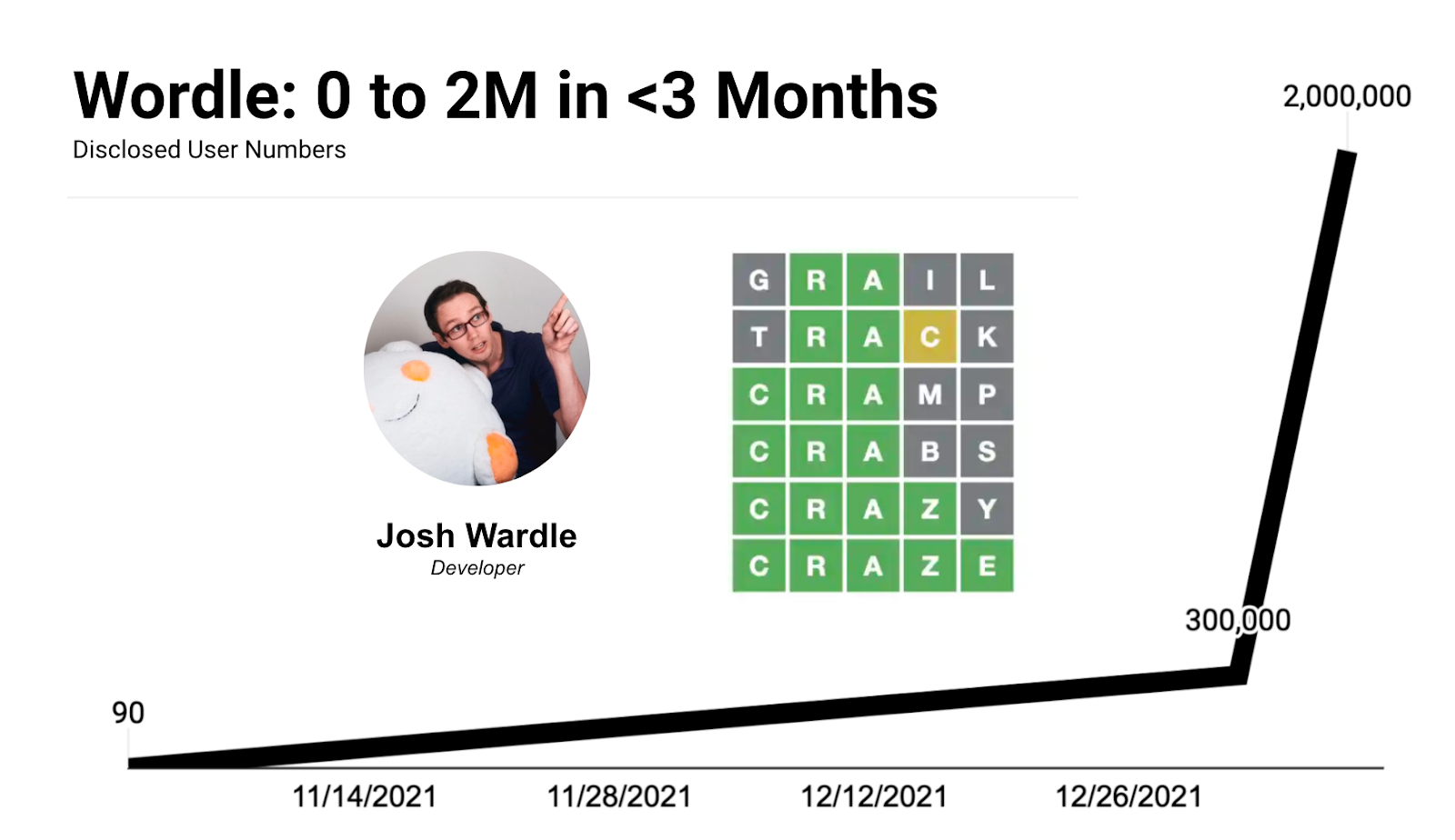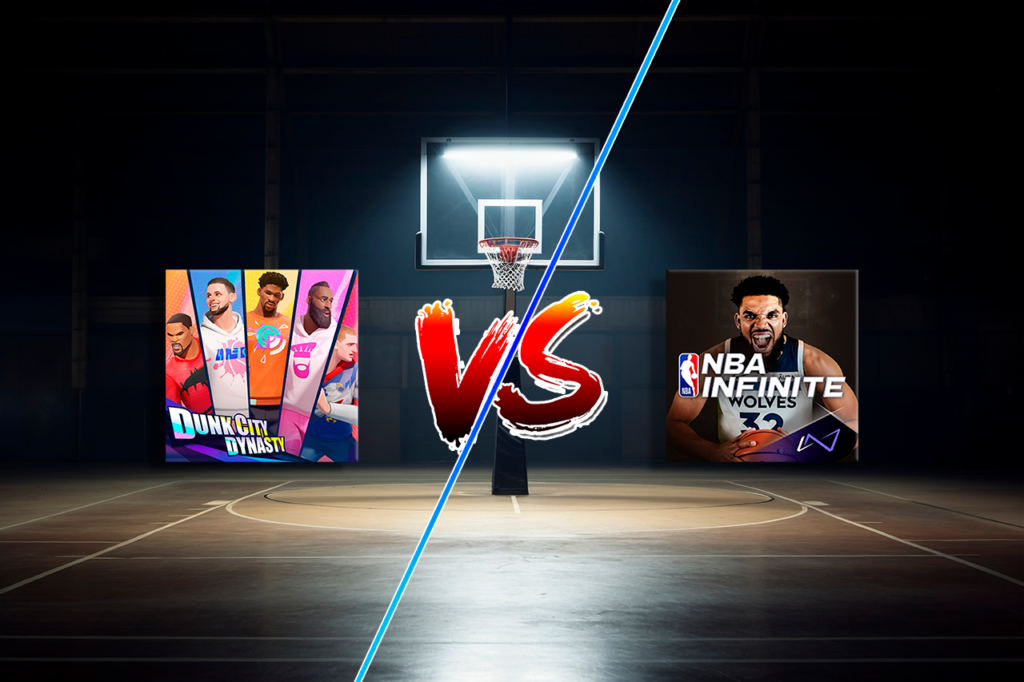Hi Everyone! Hi everyone. It’s only Wednesday and so much has already happened this week — from Microsoft’s acquisition of Activision to massive raises from Animoca Brands, Dream Games, and Spyke. We’ll be covering these topics in the next few issues, so stay tuned. Today, let's dig into the viral phenomenon, Wordle
Crypto Corner #9: What 2022 Has In Store For Blockchain Gaming
In this Metacast Crypto Corner episode, Joost van Dreunen, Miko Matsumura and Chong Ahn join your host Nico to talk about what will happen in the Blockchain Gaming world in the year to come.
You can find us on Spotify, Apple Podcasts, Google Podcasts, our website, or anywhere else you listen to podcasts. Also, remember to shoot us any questions here.
Wordle: A Mini-Deep Dive
Source: TapSmart
We're just a few weeks into 2022 and we already have our first hit of the year. As Emily Coleman said, “Wordle is the sourdough starter of Omicron.” The simple word game has gone viral. In a world of increasing social disconnection and outside-the-home chaos, Wordle has been a comforting, participate-with-others social gaming phenomenon.
It’s the game that took over all our social media feeds. Much the same as many cult gaming phenomena since Covid began — from Among Us to Fall guys — Wordle has broken into the cultural zeitgeist. Now, everyone wants to be Wordle.
A Brief Game in Brief
Wordle is a daily word guessing game. Players have six tries to guess the five-letter word of the day. Each guess gives you feedback on if the letters you placed are in the word, in the word and in the right position, or not in the word. If it is in the word but in the wrong position, it is colored yellow. If it is in the word and in the right position, it is colored green. Letters not included in the daily word appear in gray.
The Wordle Instructions
Several elements of Wordle’s game mechanics have contributed to its success. The three that I want to focus on are mass-appeal difficulty, limited content, and shareable content.
Most notably, Wordle has tuned the difficulty just right. 5-letter words come in all shapes and sizes. Wordle forgoes this complexity and chooses words that just about everyone around the world can solve. Recent solutions include solar, panic, tangy, favor, drink, query, and crank. The occasional hard word helps keep players hooked.
The overall tuning serves to hook a wider consumer audience. Looking at Google Trends, many of those interested in the game are in Spain, Singapore, or elsewhere around the world (Wordle en español, anyone?). The game's design is approaching enough that it makes the title accessible for an English as a second language audience.
Another mechanic that has worked to Wordle’s success is its limited content. With unlimited time but limited tries, the game has a tight core loop with a clear endpoint: there is only ever one word to solve a day. As game designers have known for decades, scarcity creates intrigue. In Wordle’s case, the limited content keeps the game mass-market friendly. No one can grind their building technique 12 hours a day, as they can in Fortnite, to outmatch you.
The game is intended to be completed in just 3-5 minutes per day, though some play longer. If players really care, they can go more rounds than six. They can play in incognito mode, or on someone else’s device. The entire list of words is even available through the website’s source code. Players have created all sorts of metas to play this relatively simple game. This allows users to customize their playtime to their availability and interest. But, they cannot on playing forever. The limited content keeps the game safely engaging.
Users also share a common enemy: guessing the word of the day. This makes the challenge of taking down that enemy highly shareable.
It is so fun to brag about word games. But unlike most word games — where the difficulty is sorted out via adaptation, settings, or matchmaking — Wordle has a shared difficulty. Most games also draw from a random set of words. Wordle’s single target makes it more of a discussable topic. One Finnish player started using colored square emojis to depict his progress in the six rounds, and it was a hit. So, it was added to the game.
It is hard to overemphasize how important the format has been critical to the growth of Wordle. It instantly tells a story to players and intrigues non-players. Jim Acosta of CNN with 2.3M Twitter followers even had to join in.
What I find so interesting about the format is that it uses emojis cleverly to replicate the entire game meta in one simple sequence. It perfectly adapts to the emoji-zeitgeist of social media today. The format also completely lacks promotions. There is no link to the game. This point is worth double-clicking on (indeed, perhaps more important than the game mechanics themselves is the game philosophy). As its creator, Josh Wardle — yes Wardle created Wordle — said: “It’s not trying to do anything shady with your data or eyeballs. It’s just a game that’s fun.”
In a world where games are hits through social and streaming, Wordle has broken the mold on virality and gamified consumer content.
The Wordle Backstory
Chapter 1 — Josh Wardle
Josh Wardle began his career after graduating with an MFA in Digital Arts from the University of Oregon at Reddit. He was an Office Artist for three years. Eventually, he transferred over to the product management department, where he landed a role on the community engineering team. There, Josh was responsible for not one, but three socially viral hit projects around Reddit’s April Fool’s Day campaigns from 2015-2017.
The Button game, from Vox
The first came in 2015 and was known as the Button. The Washington Post called it, “the Reddit game that ate the internet.” The premise was simple: it would go away if no one clicked the button before time was up. As long as someone pressed the button, the game would continue on. The game inspired a cult-like fervor amongst Reddit communities. Groups were mobilized to never let the button hit zero. Suddenly, Redditers and writers alike were using it to better understand apocalyptic psychology. Its simplicity allowed users to graft onto it all sorts of their own notions. After two months, the button finally hit zero.
As a PM responsible for engineering smashing experiences, Josh had hit his first home run. The game was a media and user sensation. This would give the team the space to launch their next social experiment in 2016: Robin. It was a massively multiplayer chat game that had so many simultaneous users Reddit had to shut it down. It would be a great lesson for the team in building for scale.
The result of r/people, another viral project by Wardle
In 2017, the team hit its third homerun with r/place. Over 72 hours, users were given an empty 1000 by 1000-pixel canvas to color. Users were rate-limited in their ability to place pixels. So, alone, they could not make an impact. But, together, groups could get together to create something coordinated. This resulted in over one million users playing the game together. Their stories number in the thousands and live forever documented in the r/place Atlas.
It was another giant viral hit for the community engineering team. Another set of learnings for him to file in his bank, too. People liked an open, pure canvas with a limited timeframe. Eventually, Wardle switched over to the Software Engineering team at Reddit. These experiences would set him up for the next chapter. Wardle had developed a deep history and proven track record in interactive and social game development. What happened next with Wordle is really no surprise, given his expertise.
Chapter 2 — A Love Story
In 2021, Wardle and his partner developed an obsession with word games. They had a morning routine to play them. As a love letter to his partner, Josh created Wordle. It soon became part of their morning routine.
This encouraged Josh to share it with family and friends on WhatsApp. Quickly, the game became the subject of the family’s regular group chats. Everyone would thread their replies to the wordle, trying to one-up one another by completing the daily word more elegantly.
Josh realized more people could enjoy the game than just his circle, so he made the game available to the public.
Chapter 3 — Massive Growth
The game was released in November. Immediately, the game had hit a sense of product-market fit. Without any paid marketing, Twitter account, or anything at all, it organically grew from there.
A few weeks later, at the turn of the year, we learned that Wordle had reached 300,000 players. It was an impressive number, and the parade of news pieces began. Coverage from outlets like The New York Times, and NPR poured in. Everyone was going mad for Wordle. After only being out for a few months, it was announced last week that Wordle has already reached 2 million players.
Despite the meteoric success, the question still looms: what happens to Wordle now? Valheim, while different in scope, saw a similar trajectory, only to see its numbers drop off precipitously. Should we expect the same fate from Wordle?
Why Is Wordle Relevant to The Games Industry?
When we consider Wordle and how it relates to the broader industry, there are so many lessons to unpack. The game's use of non-traditional channels like Twitter and group chats to reach mass-market appeal is a refreshingly varied approach to growth in an era dominated by Twitch and Steam. The game's browser-based format empowers players to tackle the game on or offline without needing an app. It's a ringing endorsement of the resurging browser-based movement being driven by companies like Playco or Artie. Even the game's user acquisition strategy brings into question how we should think about audiences. Anyone can play Wordle, couldn't the same be said for other games built for mass market appeal?
Most interestingly, Josh Wardle has gone on the record stating that plans to keep the game free, choosing to forego monetization and voicing a willingness to cover the game's server costs and future updates. It seems like Wardle is okay letting this game fade over time, but I understand and respect the beauty of being a solo developer and pursuing a side project in this way.
But just because the game won't monetize doesn't mean the updates have to stop. There are multiple ways Wardle could take the game to continue to make it more engaging for fans. Added difficulty through longer words or time constraints. Expanding social virality through public leaderboards and daily challenges. There's still plenty of opportunity for Wordle to keep innovating in the space.
When we look back in 5 years, will Wordle be a nice fad that ultimately fades away like HQ Trivia? Or are we in the process of seeing another Houseparty, which saw exponential growth to 50M downloads after being acquired by Epic Games? Either way, the game has captured the cultural zeitgeist and left behind so many lessons for product and game designers to leverage. I’m confident Wardle is in for another big-time hit in the future, but for now I’m sold on playing Wordle. (Written by Aakash Gupta)
📚 Content Worth Consuming
2022 Predictions For Mobile Gaming (Mobile Dev Memo): “I don’t see that changing in 2022. I don’t believe mobile gaming is entering a commercial winter, or that it will gradually see engagement siphoned off into other gaming formats. For one thing, the smartphone is the dominant form factor for consumer content engagement: these new business models and interactivity prototypes likely need to adapt to that, and not the other way around. Similarly, the mobile ecosystem offers a very robust and direct path to an enormous market through the platform app stores operated by Google and Apple. While I do believe the future of mobile content platforms necessitates the disintermediation of that distribution and curation dynamic, that isn’t likely catalyzed in 2022, at least appreciably (but more on that below).” Link
Global Gaming Report (DrakeStar): “Drake Star is pleased to publish the 2021 edition of its Global Gaming Industry Report providing key insights into the gaming deal activities for the year. 2021 turned out to be an amazing year for gaming, smashing the 2020 numbers, previously the strongest year in gaming, by a huge margin in terms of both total deal volume and dollar value. The disclosed deal value for deals announced or closed was $85B across 1,159 transactions in 2021, almost three times the dollar volume for full year 2020. The report analyzes the full year in terms of deal activity and volume across market segments (M&A, private placements, IPOs, SPACs, public financings), M&A activity by volume and multiples, public market performance and valuations, and discusses the most active gaming buyers and venture capital (VC) investors.” Link
Decentraland: The Metaverse’s Early Mover (The Generalist): “Like many others of his generation, Ordano had grown up on massively multiplayer online role-playing games (MMORPGs). In particular, he'd been inspired to take up coding after dabbling with Argentum Online, an open-source facsimile of Ultima Online, made for the Argentine market. These experiences would prove formative as he and his colleagues thought through the potential of building a virtual world. Ordano noted that they were also "heavily inspired" by Second Life, a virtual world developed by Linden Lab. Over the next two years, the quartet developed their thinking, returning again and again to the idea of building "a completely transparent 'game’/experience, something that is open source and regulated by its community," according to Ordano. A new type of virtual world; a decentralized land.” Link
The World’s Most Valuable Per Employee Company: Supercell (Product Growth): “When it comes to legendary cultures, and small teams redefining industries, Supercell is a shining example. Last week, The Information reported Tencent is in talks to buy out the remaining 16% of external investors in the Finnish gaming super company. In the process, it plans to mark up Supercell’s value to $11B. Supercell only employs 340 people. It has achieved a valuation of $32M per employee. You would be hard pressed to find a company in any sector anywhere in the world with a higher valuation per employee. Common examples when I searched and asked around include Shopify, $6M per employee as of publishing, and Apple, $18M per employee. Supercell blows them out of the water.” Link
🔥 Featured Jobs
-
Polygon Studios: VP Gaming (Remote)
-
Rec Room: UGC Development Lead (Seattle; Remote)
-
Riot Games: Biz Ops Manager (LA)
You can view our entire job board — all of the open roles, as well as the ability to post new roles — below.
Thanks for reading, and see you next week! As always, if you have feedback let us know here.


